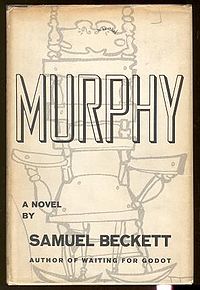- Murphy (novel)
-
Murphy 
1957 Grove Press edition cover of Murphy.Author(s) Samuel Beckett Country UK Language English Publisher Routledge Publication date 1938 Media type Print (Paperback, hardcover) Pages 282 OCLC Number 30716830 Murphy, first published in 1938, is a novel as well as the third work of prose fiction by the Irish author and dramatist Samuel Beckett. The book was Beckett's second published prose work after the short-story collection More Pricks than Kicks (published in 1934) and his unpublished (until 1992, post-mortem) first novel Dream of Fair to Middling Women. It was written in English, unlike much of Beckett's later writing, which he composed in French. After many rejections, it was published by Routledge on the recommendation of Beckett's painter friend Jack Butler Yeats.
Plot summary
The plot of Murphy follows an eponymous "seedy solipsist" who, urged to find a job by his lover Celia Kelly, begins work as a male nurse at the Magdalen Mental Mercyseat in north London, and finds the insanity of the patients an appealing alternative to conscious existence.
Murphy, gone to ground in London lodgings and then in the hospital, is pursued by a ragtag troupe of eccentrics from his own country, each with their own often-conflicting motivations. Neary, a practitioner of eastern mysticism, seeks Murphy as a love rival and then as compatible friend in the absence of all others. Miss Counihan's attachment to Murphy is romantic. Among Wylie's motivations, Miss Counihan is perhaps the strongest. And Cooper, Neary's simpleton servant and fixer, joins the trail for money, alcohol, and to serve his master.
Among other things, Murphy is an example of Beckett's fascination with the artistic and metaphorical possibilities of chess. Near the novel's end, Murphy plays a game of chess with Mr. Endon, a patient who is "the most biddable little gaga in the entire institution". But Murphy cannot replicate his opponent's symmetrical and cyclical play, just as he is unable to will himself into a state of catatonic bliss. He resigns "with fool's mate in his soul", and dies shortly afterwards. Beckett relates the game in full English notation, complete with a comically arch commentary.
Moving between Ireland and England, the novel is caustically satirical at the expense of the Irish Free State, which had recently banned Beckett's More Pricks Than Kicks: the astrologer consulted by Murphy is famous 'throughout civilised world and Irish Free State'; 'for an Irish girl' Murphy's admirer Miss Counihan was 'quite exceptionally anthropoid'; and in the General Post Office, site of the 1916 Rising, Neary assaults the buttocks of Oliver Sheppard's statue of mythic Irish hero Cúchulainn (the statue in fact possesses no buttocks).
Indeed, the censor is roundly mocked: Celia, a prostitute whose profession is described tactfully in a passage by the author, who writes that "this phrase is chosen with care, lest the filthy censors should lack an occasion to commit their filthy synecdoche." Later, when Miss Counihan is sitting on Wylie's knee, Beckett sardonically explains that this did not occur in Wynn's Hotel, the Dublin establishment where earlier dialogue took place. The novel also contains a scabrous portrait of poet Austin Clarke as the dipsomaniac Austin Ticklepenny, given to unreciprocated 'genustuprations' of Murphy under the table; against Oliver St. John Gogarty's advice, Clarke declined to sue.
Murphy indeed cannot go insane to achieve freedom. What he turns to instead is nothingness, and his ashes are properly spread amidst the grime of a bar after immolating himself with the assistance of gas in his bedroom at the hospital. Celia also discovers the beauty of nothingness, as she loses her love, Murphy, and her grandfather's health declines. Beckett seamlessly converts comedy to terror of non-existence, as he does in his later work, Waiting for Godot.
Among the many thinkers to influence Murphy's mind-body debate are Spinoza, Descartes, and the little-known Belgian occasionalist Arnold Geulincx.
External links
- The chess game between Murphy (White) and Mr Endon (Black) Mr Endon's illegal move 42. ... K–Q2 has been replaced with 42. ... K–K2
The prose of Samuel Beckett Novels: Dream of Fair to Middling Women • Mercier and Camier • Murphy • Watt • Molloy • Malone Dies • The Unnamable • How It IsShort stories: “Assumption” • “Sedendo et Quiescendo” • “Text” • “A Case in a Thousand” • “First Love” • “The Expelled” • “The Calmative” • “The End” • “Texts for Nothing” • “From an Abandoned Work” • “The Image” • “All Strange Away” • “Imagination Dead Imagine” • “Enough” • “Ping” • “Lessness” • “The Lost Ones” • “Fizzles” • “Heard in the Dark 1” • “Heard in the Dark 2” • “One Evening” • “As the story was told” • “The Cliff” • “neither” • “Stirrings Still” • “Company” • “Ill Seen Ill Said” • “Worstward Ho”
Short story collections: More Pricks Than Kicks • Stories and Texts for Nothing • The Complete Short Prose 1929-1989
Non-fiction: Three Dialogues (with Georges Duthuit and Jacques Putnam) • Disjecta • Proust • "The Capital of the Ruins"
Categories:- 1938 novels
- Novels by Samuel Beckett
- Debut novels
Wikimedia Foundation. 2010.
